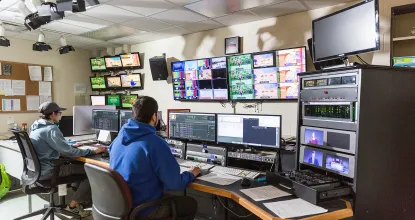Each major in the CAMS Department has a mission statement to indicate its focus and goals. The statement for each major is presented below.
Communication Studies
Students majoring in Communication Studies (COMM) will graduate with the knowledge and skills of human communication needed to successfully manage a range of professional and private relationships.In particular, we expect them to have or be able to acquire further specialized knowledge regarding communication principles and practices, critically examine the communication implications inherent in interpersonal, organizational, civic, and multicultural arenas, and use their understanding and skills in applied communication settings both as individuals and as members of teams.
Electronic Journalism
Students majoring in Electronic Journalism (ERJN) will graduate with skills, knowledge, and experiences germane to a career path in broadcasting. The issues that serve as the subject matter for news story writing and production often center on community issues that have the potential to foster further interest in civic engagement. EJRN students thus are expected to have a functional knowledge of key aspects related to communication law, media literacy, well-structured messages, visual and spoken performance, and video production in team environments typically requiring research skills and multicultural sensitivities.
Media Production and New Technology
Students majoring in Media Production and New Technology (MPNT) will graduate with the knowledge, skills, and experience that will enable them to use and understand electronic communication media in television, radio, and web-based environments.And, since issues that influence and regulate media production or the use of new technologies often depend on an understanding of communication law, media literacy, visual and aural properties, and working in groups that require research skills and multicultural sensitivities, MPNT graduates are expected to have a body of theoretical knowledge as well.
Entertainment and Sports Promotion
Students majoring in Entertainment and Sports Promotion (ESPR) will graduate with skills, knowledge, and experiences germane to a public relations-like career path in the sports and entertainment industries. The issues that serve as the subject matter for promoting entertainment and sports-related events or personalities require entry-level communication practitioners to manage a variety of tasks at the intersection of various publics' desires, client requirements, situational constraints, and civic engagement. ESPR students thus are expected to have a functional knowledge of key aspects related to professional ethics and communication law, the nature of media relations, development of promotional campaigns, and functioning within team environments typically requiring research skills and multicultural sensitivities.
Public Relations
Students majoring in Public Relations (PUBR) will graduate with skills, knowledge, and experiences germane to a career path managing public relations in the public- or private-sector. The issues that define a professional program in public relations often revolve around research, writing, planning and budgeting skills that students need to succeed in a client-oriented job market and civil society.PUBR students thus are expected to have a functional knowledge of key aspects related to communication law, the conceptual basis for communicating with various internal and external publics, skills related to conducting communication campaigns, and functioning within team environments typically requiring multicultural sensitivities and the engagement of society at large.
Theatre
Students majoring in Theatre (THEA) will graduate as artists and technicians trained in the effective communication of playwrights’ and directors’ concepts and intentions for dramatic performance in a social context. In both performance and technical areas, students will learn styles and methods for communicating classical and contemporary dramatic messages pertinent to modern culture and our civic society, as well as the theoretical bases of those approaches. In addition, students will demonstrate knowledge and skills associated with a collaborative approach to producing dramatic performances and a organizational context that emphasizes resource sustainability.







